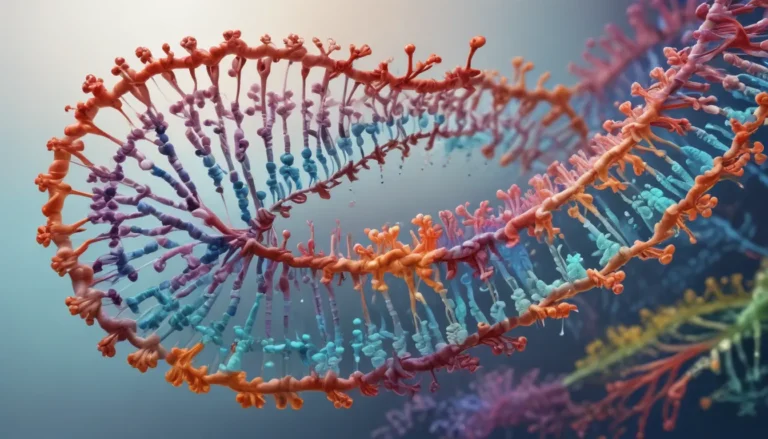A Note About Images: The images used in our articles are for illustration purposes only and may not exactly match the content. They are meant to engage readers, but the text should be relied upon for accurate information.
In the realm of biology, epigenetic inheritance has emerged as a captivating field of study, drawing increased attention in recent years. While genetic inheritance is well-known, where traits are passed down through the DNA code, epigenetic inheritance introduces a new dimension. This phenomenon involves changes in gene expression that can be inherited across generations without altering the DNA sequence itself. Join us as we delve into 14 intriguing facts about epigenetic inheritance, illuminating the profound influence of environmental factors on gene activity and the inheritance of traits.
Understanding Epigenetic Inheritance
Epigenetic inheritance challenges the conventional understanding of genetic inheritance by focusing on changes in the structure of DNA and proteins that can be passed down to future generations. Unlike traditional genetics, which revolves around alterations in the DNA sequence, epigenetic inheritance highlights modifications to gene expression patterns.
The Impact of Environmental Factors
Environmental factors such as diet, stress, exposure to toxins, and other influences can shape epigenetic marks on our DNA, impacting gene expression and potentially affecting future generations. These modifications can play a vital role in disease susceptibility and overall well-being.
The Role of Early Development
During early embryonic development, epigenetic changes play a pivotal role in determining cell fate and shaping the organism’s structure. These alterations can have long-lasting effects on an individual’s health and development.
Disease Susceptibility and Epigenetic Inheritance
Epigenetic modifications have been linked to various diseases, including cancer, diabetes, and neurological disorders. Understanding how these modifications are inherited can shed light on disease prevention and treatment strategies.
Reversibility of Epigenetic Marks
Unlike genetic mutations, epigenetic marks are reversible, offering opportunities to modify gene expression patterns by targeting and altering these marks. This presents potential avenues for therapeutic interventions.
Skipping Generations and Sex-Specific Inheritance
Epigenetic changes can either be transmitted from one generation to the next or skip a generation altogether. Additionally, studies have shown that these modifications can exhibit sex-specific patterns of inheritance, highlighting unique mechanisms based on gender.
Epigenetic Inheritance Across Species
Epigenetic inheritance is not exclusive to humans but has been observed in a wide range of organisms, emphasizing the conservation of these mechanisms throughout evolution.
Impact of Trauma and Behavioral Changes
Severe stress or trauma can trigger epigenetic modifications that are passed on to offspring, underscoring the intergenerational impact of traumatic events. Furthermore, these modifications can influence behaviors and cognitive functions, such as aggression, anxiety, and memory.
Lifestyle Choices and Epigenetic Profile
Your lifestyle choices, including exercise, sleep patterns, and social interactions, can influence your epigenetic profile. Making healthy choices can lead to positive epigenetic changes that may be inherited by future generations.
Epigenetic Inheritance and Nature versus Nurture
Epigenetic inheritance blurs the line between nature and nurture, suggesting that environmental factors can have a lasting impact on gene expression and subsequent generations.
Ongoing Research and Potential for Medicine
Research in epigenetic inheritance is still evolving, with ongoing studies shedding light on the mechanisms and implications of this field. The potential for personalized medicine, disease prevention, and innovative therapies is vast, highlighting the transformative impact of epigenetic research in healthcare.
Conclusion: Unlocking the Mysteries of Epigenetic Inheritance
In conclusion, epigenetic inheritance unveils a new dimension of genetic inheritance, shedding light on how traits can be passed down through changes in gene expression patterns. The complexities of epigenetics offer insights into evolution, development, and disease susceptibility, shaping our understanding of genetics. As we continue to explore this captivating field, we unravel more intriguing facts about epigenetic inheritance and its profound impact on human health and well-being.
FAQs: Unraveling Common Queries About Epigenetic Inheritance
- What is epigenetic inheritance? Epigenetic inheritance involves the transmission of traits through changes in gene expression patterns that do not involve alterations in the DNA sequence itself.
- How does epigenetic inheritance differ from genetic inheritance? Genetic inheritance involves the transmission of genetic material, while epigenetic inheritance entails changes in gene expression influenced by environmental factors.
- Can epigenetic modifications be reversed? Yes, epigenetic modifications are reversible and can be influenced by factors such as diet, exercise, and environmental exposures.
- Are epigenetic changes heritable in all organisms? Epigenetic changes occur in various organisms, indicating crucial roles in development, adaptation, and disease susceptibility across species.
- Do epigenetic changes impact evolution? Epigenetic inheritance can drive rapid adaptations and responses to environmental pressures, influencing evolutionary processes.
- Can epigenetic modifications be used in medical treatments? Epigenetic modifications hold promise as targets for therapeutic interventions, offering potential applications in disease treatment.
In the expansive realm of epigenetics, the intricacies of gene regulation and inheritance continue to fascinate researchers and enthusiasts alike. Dive deeper into this captivating field to uncover more about epigenetic mechanisms, their implications for health and disease, and their potential applications in various disciplines. As we journey through the labyrinth of epigenetic inheritance, each discovery brings us closer to understanding the profound impact of this intricate phenomenon on life as we know it.






